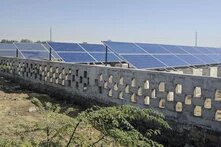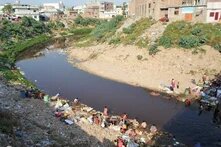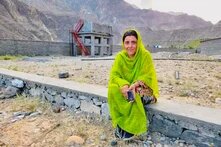
Pakistan played a crucial role in operationalizing the Loss and Damage Fund which was announced on the very first day of the COP and played an active role during the two weeks long conference which saw some difficult negotiations

COP28 (or the 28th meeting of the Conference of Parties signatory to the United Nations Framework Convention on Climate Change) that was held in the shiny skyscraper city of Dubai in December 2023 was a well-organized affair, hosting around 120,000 delegates from around the globe (more than double the usual number). Pakistan played a very active role with a large official delegation and a busy Pakistan pavilion, themed "Build Resilience Together," which attracted high-level officials from Pakistan and around the globe. Pakistan’s most notable success at the COP, however, was its helpful role in operationalizing the Loss and Damage Fund, which amassed pledges amounting to USD 792 million.
The Pakistani delegation was led by Pakistan’s Federal Minister for Climate Change and Environmental Coordination Ahmed Irfan Aslam, with Secretary of the Ministry of Climate Change, Asif Hyder Shah, acting as principal negotiator. Officials from the Ministry of Foreign Affairs also led key negotiations on different tracks as they do each year – the real work of the COP takes place inside the closed negotiations for which you need a “Party” badge.
According to Shah, the early operationalization of the Loss and Damage Fund that was agreed upon at the opening plenary of the first day of COP28 was a “triumph building upon Pakistan's crucial role in creating and operationalizing the fund in both COP27 and COP28, resulting in its election to the Loss and Damage Fund Board”. The creation of the Fund is seen as a hard-won victory by developing countries, with the hope that rich, polluting countries will finally provide financial support for some of the destruction that is already under way due to climate change.
Ali Tauqeer Sheikh, a longtime Pakistani climate expert, will be representing Pakistan on the Loss and Damage Fund Board along with representatives from 13 other countries. He says the first meeting of the new Board will be held end January. “So far, we don’t know the structure, the financing, the eligibility, the priority criteria for the Loss and Damage Fund. All we know for now is that it will be hosted at the World Bank for 4 years. It is the mandate of the Board to sort all this out. A lot of work lies ahead”. In his view, Pakistan will remain a focal body on Loss and Damage and many developing countries will be looking to Pakistan for guidance.
Local adaptation is the key
According to Imran Khalid, who works on environmental and climate governance at WWF-Pakistan and who also attended the COP in Dubai, “Certainly the Loss and Damage Fund has been a big diplomatic success for Pakistan. However, with only around USD 700 million coming into the Fund that’s just peanuts. Pakistan’s losses during the massive floods of 2022 were in tens of billions of dollars alone. More money needs to come into this Fund”. Khalid points out that for a vulnerable country like Pakistan, adaptation is very important but “local level adaptation will be discussed at next year’s COP”. Pakistan’s federal cabinet has recently approved the 2023 National Adaptation Plan, with a primary focus on protecting communities at risk from climate change.
The National Adaptation Plan calls for a climate-resilient Pakistan in which the capacity of local communities to protect themselves and their environment is enhanced by providing green jobs, sustainable infrastructure, technology and effective coordination between the government, private sector and civil society.
Recharge Pakistan project
In Dubai, caretaker Prime Minister Anwar-ul-Haq Kakar who represented Pakistan during the high level segment of the COP, launched the “Living Indus Initiative” at a side-event whose key component is the USD 78 million 'Recharge Pakistan' adaptation project. This project is funded by grants from the Green Climate Fund (USD 68 million) plus USAID (USD 5 million) and the Coca Cola Foundation (USD 5 million).
WWF-Pakistan will implement the project along with the Ministry of Climate Change and Ministry of Water Resources. “It was a long process to get this climate financing – the feasibility study alone took 2 years”, explains Khalid from WWF-Pakistan. “The project will rely on nature based solutions in Sindh, Balochistan and Khyber Pakhtunkwa provinces to restore the Indus Basin and fortify Pakistan’s resilience. We need these types of adaptation projects in the future. There are funding windows available out there but there is a lot of competition to get the funding”.
The private sector was heavily involved in COP28 and according to Ali Tauqeer Sheikh “there were pledges of almost USD 750 billion made in bi-lateral deals that were taking place in private sector investments. That’s a lot of money outside the UNFCCC process. Pakistan needs to build the capacity to pursue this private sector track. There are lots of opportunities there and the government needs to engage with the private sector both domestically and internationally”.
Transitioning away from fossil fuels
Although COP28 finally agreed to a roadmap for “transitioning away from fossil fuels” for the first time at a UN climate conference on the last day of the climate summit, the deal still stopped short of a “phaseout” of oil, coal and gas. Sheikh says the upside is that this gives Pakistan at least a year to plan its exit plan for coal usage in the country. In recent years, the country has seen an increased reliance on coal as an affordable energy source. Currently, the power sector remains the biggest consumer of coal in Pakistan, according to the Economic Survey of Pakistan 2022-23, followed by cement industries and brick kilns.
“We now have at least a year to decarbonize our energy sector,” points out Tauqeer Sheikh. “Exiting from coal will cost us money and we need to prepare carefully like Indonesia and Vietnam”. Both these countries have received loans and investments to move away from fossil fuels under the “Just Energy Transition Partnership” a high-profile financing mechanism designed to funnel money from wealthy economies to developing world emitters for the purpose of weaning off fossil fuels.
Another opportunity for climate finance for Pakistan lies in future carbon markets. “Article 6 which deals with carbon markets was set aside at this COP but will be discussed at the next COP to be held in Baku in 2024 where it is hoped that an agreement will be reached” says Khalid. Pakistan had prepared a draft recently on “Pakistan Policy Guidelines for Trading in Carbon Markets-2023” which are guidelines for the establishment and operation of carbon markets in Pakistan. However, Khalid says the document still needs a lot of work and detailed preparation is necessary for Pakistan to take advantage of carbon markets, essentially trading systems in which carbon credits are sold and bought. Companies and individuals can use carbon markets to compensate for their greenhouse gas emissions by purchasing carbon credits from other entities that remove or reduce greenhouse gas emissions.
Pakistan Pavilion: a hub of activity
Throughout the two weeks long conference, held on the site of the vast expo centre near Dubai’s international airport, the Pakistan pavilion remained extremely busy. This year each pavilion was housed in separate buildings hence it was not easy to walk from one event to another. Delegates found all the trudging extremely tiring, however, the Pakistan pavilion attracted a lot of Pakistani members of civil society and youth (many who had gone to the COP on their own expense on NGO badges) who were keen to learn and participate in the side-events.
According to Secretary Asif Shah, “In collaboration with local and international organizations, the Ministry of Climate Change and Environmental Coordination hosted 31 side events at the pavilion, featuring representation from Balochistan, Khyber Pakhtunkhwa, Punjab and Sindh. This nuanced approach provided insights into Pakistan's challenges due to its diverse topography and cultural richness. Distinguished figures delivering statements at the Pakistan pavilion included Justice Mansoor Ali Shah and Justice Jawad Hassan, judges of the Supreme Court of Pakistan and Lahore High Court, respectively and former Minister for Climate Change Senator Sherry Rehman. Notable visitors included Inger Andersen, Executive Director of UNEP, Majid Al Suwaidi, Director General & Special Representative of COP28 Presidency, Dr. Adil Najam, President of WWF, and experts from other countries”.
Shah says Pakistan also got elected on four other important committees of the UNFCCC: Santiago network Board, Technology Executive Committee, Paris Agreement Committee on Capacity Building and Finance Executive Committee. According to Sheikh, “These committees will work to address various aspects of climate change, including technology, innovation, and finance, to achieve the goals of the Paris Agreement. Being a member of these committees will offer Pakistan strategic opportunities to leverage their workings for their synergetic impact and advantages for Pakistan”.
The two weeks long conference finally ended with one extra day taken to gavel through a decision to “transition away from fossil fuels”, the main driver of climate change. According to climate finance expert Kashmala Kakakhel who remained at the COP in Dubai until the last days, “Towards the end, a Majlis was called, a Arabic tradition, where all the heads of the delegations sat in a circle to openly negotiate. Recognising national circumstances, COP28 made history by becoming the first COP to not only name fossil fuels as the actual problem but to also transition away from them to achieve net zero by 2050, as suggested by the scientists”.
The UN conference might have ended on a positive note, but the reality remains that the world is nowhere near to ensuring the Paris Agreement goal of limiting global warming to under 1.5 degrees Celsius (which scientists consider a safe guardrail). “Negotiations over the two weeks were difficult. The Global Stocktake provided a harsh reality check for the wrong direction the world is moving in,” says Kakakhel. The UN process is time consuming and slow moving – while it does yield results, the clock is ticking and time is running out.


